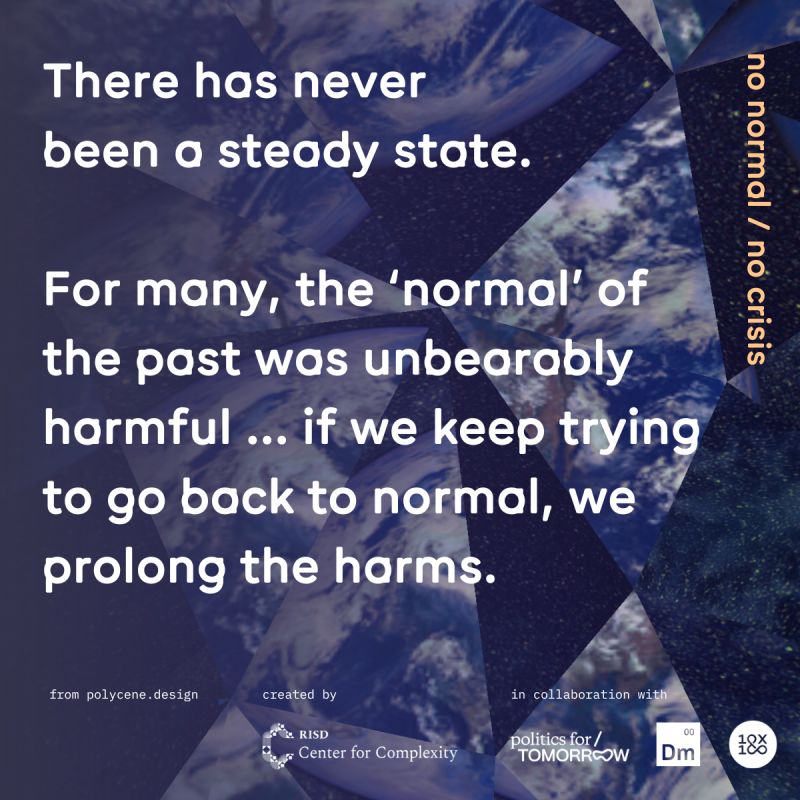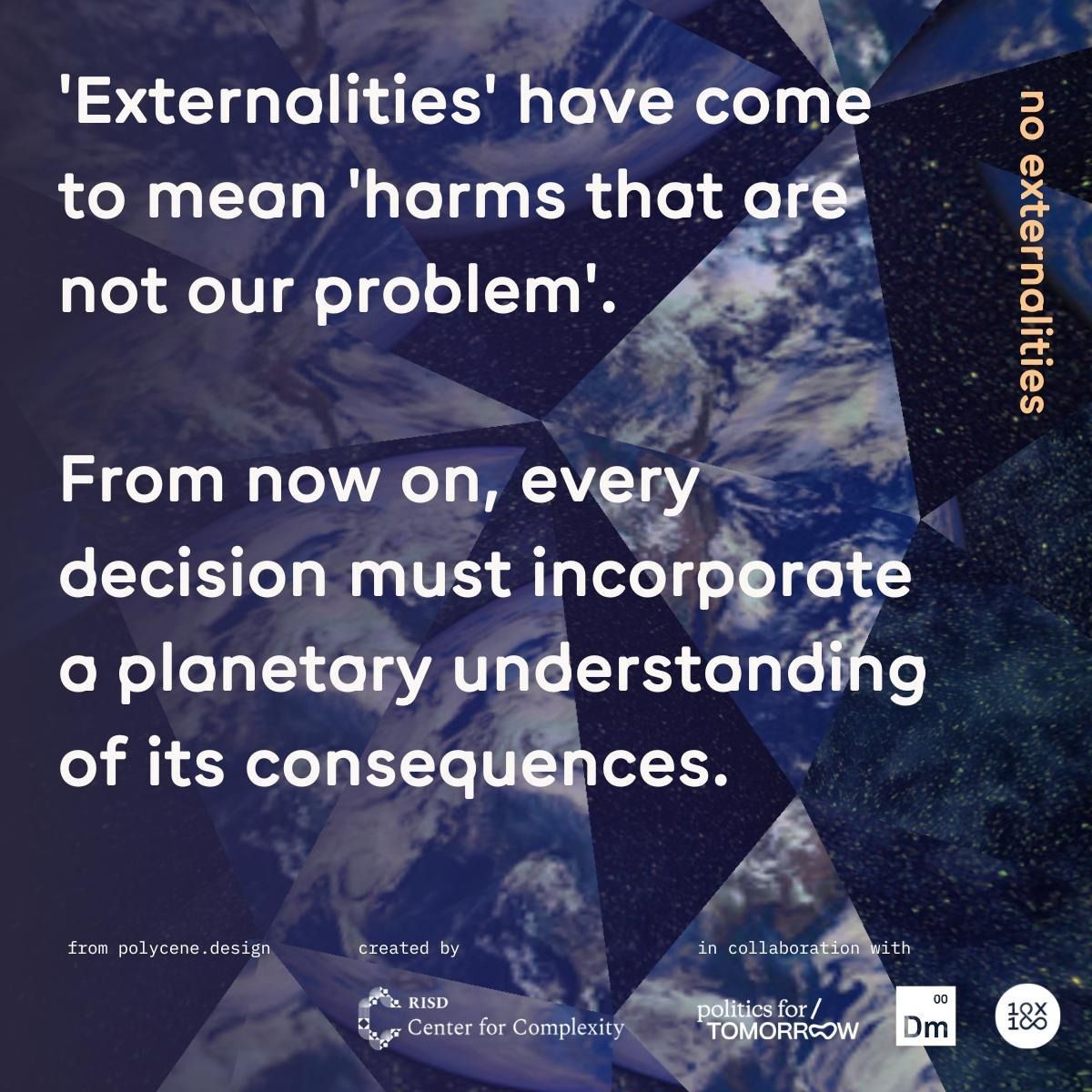Polycene Design
Project
2023-2024
Polycene.design
︎︎︎RISD Center for Complexity
︎︎︎Planetary Civics
︎︎︎Horizon 2045
︎︎︎Politics for Tomorrow
︎︎︎Dark Matter Labs
The project was funded by The John D. and Catherine T. MacArthur Foundation and The Skoll Foundation, under phase 2 of Horizon 2045.
Polycene.design
︎︎︎RISD Center for Complexity
︎︎︎Planetary Civics
︎︎︎Horizon 2045
︎︎︎Politics for Tomorrow
︎︎︎Dark Matter Labs
The project was funded by The John D. and Catherine T. MacArthur Foundation and The Skoll Foundation, under phase 2 of Horizon 2045.
Welcome to the Polycene – an era to engage with the polycrisis.
The Anthropocene marked an era where human activities significantly harmed the Earth's climate and ecosystems. The Polycene Design Manual is an attempt to articulate a design standard to negotiate "big picture" systemic challenges like health care, education, and climate change.
In the Polycene, caring and relating will replace dominion, and mastery will be redefined as a balanced coexistence with the natural world. The Polycene encourages humanity to unfold its interconnective potential.
Here, design processes and frameworks can enhance our collective imagination. However, many of them require an upgrade to better support us in recognizing the growing complexity of biophysical realities and more-than-human relationships.
What can equip this upgrade?
Planetary Studios
Planetary Studios (originally called Planetary Object Studios) begin with an area of planetary concern or a vexing problem that crosses typical disciplinary boundaries. Modeled on the Helsinki Design Lab’s Recipes for Systemic Change, we invite a mix of domain experts and imaginative thinkers to join for an intensive week-long experience. A team of facilitators supports the collaboration, documenting conversations and helping the participants shape outcomes.
Here is how we explain the idea to invitees: Planetary Studios are intensive, transdisciplinary design workshops aimed at addressing the urgent need of the 21st century for design and decision-making practices that can operate at the speed, scope, and scale demanded by today's interconnected crises.
Led by the Center for Complexity at Rhode Island School of Design (RISD), in collaboration with the H2045 collective and the 10x100 network, these studios are part of a broader effort to describe the properties of a planetary design practice. The studios focus on facilitated collaboration to develop new insights about reshaping human institutions to meet the demands of the Anthropocene.
Ocean Studio
Providence, USA. May 2023.
The first of these studios, known as the Ocean Studio, was held at Rhode Island School of Design. It brought together experts in ocean policy, governance, engineering, advocacy, design, and the arts to explore the future of ocean governance and planetary stewardship. The ocean, as a "provided commons," served as a concrete test case for applying and discovering frames and principles for planetary design. Its vastness, ecological importance, and “undergoverned” space offered opportunities to think about regenerative agreements and governance experimentation.
Participants: Aditi Juneja, Curtis Bell, Elizabeth Mendenhall, Jan Stockbruegger, Jon Soske, Lafayette Cruise, Liam Van Vleet, and Pupul Bisht.
Here is how we explain the idea to invitees: Planetary Studios are intensive, transdisciplinary design workshops aimed at addressing the urgent need of the 21st century for design and decision-making practices that can operate at the speed, scope, and scale demanded by today's interconnected crises.
Led by the Center for Complexity at Rhode Island School of Design (RISD), in collaboration with the H2045 collective and the 10x100 network, these studios are part of a broader effort to describe the properties of a planetary design practice. The studios focus on facilitated collaboration to develop new insights about reshaping human institutions to meet the demands of the Anthropocene.
Ocean Studio
Providence, USA. May 2023.
The first of these studios, known as the Ocean Studio, was held at Rhode Island School of Design. It brought together experts in ocean policy, governance, engineering, advocacy, design, and the arts to explore the future of ocean governance and planetary stewardship. The ocean, as a "provided commons," served as a concrete test case for applying and discovering frames and principles for planetary design. Its vastness, ecological importance, and “undergoverned” space offered opportunities to think about regenerative agreements and governance experimentation.
Participants: Aditi Juneja, Curtis Bell, Elizabeth Mendenhall, Jan Stockbruegger, Jon Soske, Lafayette Cruise, Liam Van Vleet, and Pupul Bisht.
Briefing and Facilitation team: Justin W. Cook, Tim Maly, Dara Benno, Prateek Shankar, Toban Shadlyn, Charlene Sequeira, and Marisa Brown.
Planetary Retreats
Planetary Retreats begin with the idea that many people working in these domains know what they need to be working on but struggle to make time to do essential work. By creating time and space and putting them in collision with other practitioners in a similar situation, we offer them a chance to step back, compare notes, and discover their next projects.
Here is how we explain the idea to invitees: Planetary Retreats are multi-day design getaways that provide a space for reflection and collaboration in times of immense uncertainty and change. Organized by the Center for Complexity, in collaboration with Politics for Tomorrow and Dark Matter Labs and unlike traditional policy conferences, these retreats emphasize facilitated collaboration and are supported by 10x100, a learning-centered coordination framework.
Designing for Planetarity
Berlin, Germany. June 2023.
Held at Diversity Lab after the Creative Bureaucracy Festival, the Designing for Planetarity Retreat was the first such retreat. It aimed to further vet and gather feedback on manual contents and use, exploring how to better steward planetary commons and coordinate for regenerative futures. Motivated by the question, "How can we design for a planet that is more than human?" and inspired by Donna Haraway's call to "stay with the trouble,” the retreat was envisioned as an exercise in holding space in a time of extreme complexity with an emphasis collective action and agency, and gathered thinkers and practitioners to transition from a paradigm of exploitation to one of constrained abundance.
Participants: Aditi Juneja, Caroline Paulick-Thiel, Cassie Robinson, Céline Semaan, Eleanor Saitta, Falk Zientz, Hartmut Graßl, Indy Johar, Jan-Christoph Zoels, Jon Soske, Marco Steinberg, and Rowan Conway.
Here is how we explain the idea to invitees: Planetary Retreats are multi-day design getaways that provide a space for reflection and collaboration in times of immense uncertainty and change. Organized by the Center for Complexity, in collaboration with Politics for Tomorrow and Dark Matter Labs and unlike traditional policy conferences, these retreats emphasize facilitated collaboration and are supported by 10x100, a learning-centered coordination framework.
Designing for Planetarity
Berlin, Germany. June 2023.
Held at Diversity Lab after the Creative Bureaucracy Festival, the Designing for Planetarity Retreat was the first such retreat. It aimed to further vet and gather feedback on manual contents and use, exploring how to better steward planetary commons and coordinate for regenerative futures. Motivated by the question, "How can we design for a planet that is more than human?" and inspired by Donna Haraway's call to "stay with the trouble,” the retreat was envisioned as an exercise in holding space in a time of extreme complexity with an emphasis collective action and agency, and gathered thinkers and practitioners to transition from a paradigm of exploitation to one of constrained abundance.
Participants: Aditi Juneja, Caroline Paulick-Thiel, Cassie Robinson, Céline Semaan, Eleanor Saitta, Falk Zientz, Hartmut Graßl, Indy Johar, Jan-Christoph Zoels, Jon Soske, Marco Steinberg, and Rowan Conway.
Briefing and Facilitation team: Justin W. Cook, Tim Maly, Dara Benno, Prateek Shankar, Toban Shadlyn, Charlene Sequeira, Caroline Paulick-Thiel, Blasius Walch, Jörg Petzold, Philip Hector, and Jacob Hühn.
Polycene Design Manual
The Polycene Design Manual is dedicated to this question. It seeks to highlight the potential of shared values and responsibilities, favoring aspirations for an expanded sense of self. It is an invitation to commune and collaborate, to seek identity in the collective, and to demand accountability and mutual flourishing.
In collaboration with RISD Center for Complexity, Horizon 2045, Dark Matter Labs and Politics for Tomorrow, this draft design manual is an archive of essays, activities, and project outcomes that have emerged from exploration of the Polycene — our proposed framing for an aspirational geological epoch where stewardship replaces dominion, and mastery is redefined as a balanced coexistence with the natural world. It encourages a multiplicity of approaches, ethical considerations, and community engagements to address the complex challenges we face in whats been termed the ‘polycrisis’.
In collaboration with RISD Center for Complexity, Horizon 2045, Dark Matter Labs and Politics for Tomorrow, this draft design manual is an archive of essays, activities, and project outcomes that have emerged from exploration of the Polycene — our proposed framing for an aspirational geological epoch where stewardship replaces dominion, and mastery is redefined as a balanced coexistence with the natural world. It encourages a multiplicity of approaches, ethical considerations, and community engagements to address the complex challenges we face in whats been termed the ‘polycrisis’.
Planetary Civics Inquiry
The launch of the Planetary Civics Inquiry. “Beyond the National: Cities, Bioregions, and the Planetary” event. I present at 1:06:00.
This work has since evolved and supported continued efforts such as the Planetary Civics Inquiry - an international alliance between RISD Center for Complexity, Dark Matter Labs, Politics for Tommorrow and RMIT.
The iniative launched on February 26, 2025, structured as a 12-hr relay of transcontinental events. I was invited to speak at the “Beyond the National: Cities, Bioregions, and the Planetary” event.


Related Press / Publications
Isabel Roberts. “RISD’s Center for Complexity Presents Exhibition Addressing the Threats of a Human-Centric World”, RISD Media, October 10, 2023.
Simone Solondz. “RISD’s Center for Complexity Developing Design Manual for Maintaining Life on Earth”, RISD Media, August 10, 2023.
Index